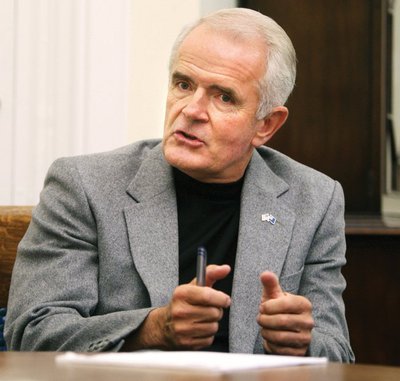Tuesday, Oct. 20, 2009 | 2 a.m.
Sun Coverage
Sun Archives
- Ruling by judges rattles mortgage industry (10-3-2009)
- Housing scam artists staying on the move (9-25-2009)
- Mortgage fraud is expected to escalate (7-17-2009)
- Editorial: Tackling fraudulent loans (4-10-2009)
- Foreclosures attracting fraudulent schemes (2-5-2009)
- Las Vegas man pleads guilty to mortgage loan scam (11-20-2008)
- Hearing delayed for 2 mortgage brokers accused of fraud (11-20-2008)
- Arrests made in mortgage loan scam (11-4-2008)
- Mortgage fraud blamed in more foreclosures (10-21-2006)
Compliance with a new law aimed at regulating mortgage modification and foreclosure prevention, a runaway industry rife with scammers, is off to a slow start, causing concern for those on the front lines.
Only 50 companies statewide have applied for the state’s new licenses for loan modification and foreclosure consultant services. That number represents as little as one-tenth of the businesses offering one or both of the services targeted by the new law, says Joseph L. Waltuch, commissioner of the Mortgage Lending Division of the state’s Business and Industry Department.
After an extension was granted to allow each applicant to post the required $75,000 surety bond, only 18 have done so, and none has completed the process for obtaining the licenses, Waltuch adds.
Consumer advocates and others are eyeing that slow uptake and worrying that it indicates the law will fail to meet its main goals: regulation of a fast-growing industry and, more important, deterrence of fraud.
“A lot of companies that were operating illegally before are still operating illegally,” says Leticia Bravo, ombudsman for minority affairs at the Business and Industry Department and one of the more publicly active members of a state task force on fraud.
Las Vegas Valley homeowners call Bravo’s office about five times a day on the issue, she says. She urges them to file complaints with the state attorney general and the Mortgage Lending Division.
Many of the companies appear to be peddling scams, Bravo says, noting that “they’re all preying on the desperation and the hope people have to keep their homes.”
That has been the case for at least a couple of years, which is why the 2009 Legislature sought to regulate the mortgage modification assistance companies, passing a measure requiring that they be licensed and bonded.
Gov. Jim Gibbons put in place emergency regulations under the law July 8, and permanent ones began Aug. 25.
Nonetheless, Bravo says she has a five-drawer filing cabinet half-full of complaints from homeowners who say companies offering changes to their mortgages ripped them off. That doesn’t include papers from dozens more cases on top of her desk.
Many recent callers may be exposing one of the law’s weak spots. They complain about lawyers who offered to help with mortgage modifications and then did nothing. It turns out the law does not require the license for attorneys, though it does cover anyone working for or associated with an attorney.
The rising tide of victims owes to the perfect storm of high foreclosure and unemployment rates and confusion over the new law, perhaps most notably in the Hispanic community, Bravo says.
Bravo says she is “hesitant” to see the new law as a means to deter scams.
So is Helena Garcia, founder of the nonprofit organization Latinos en Accion, which has fielded about 30 complaints in the past year about companies offering to modify mortgages. She said she has obtained refunds for homeowners in about a third of the cases and forwarded the rest to the attorney general.
Garcia thinks the fraud will stop only when would-be scammers see the consequences for committing crimes. “The only thing that will fight fraud is if people found guilty are put in jail,” she says.
So far, that hasn’t happened.
Waltuch says he understands the frustration felt by consumers and their advocates, but he thinks that the pace of complaints will soon begin to fall as word gets out about the law.
Elisabeth Daniels, spokeswoman for the Business and Industry Department and chairwoman of its task force against fraud, points out that Waltuch’s agency is complaint-driven. She says there is no way of knowing for certain how many companies are offering to help Nevadans get their loans modified or avoid foreclosures.
Ernest Figueroa, a deputy attorney general who deals with the issue, says the state’s enforcement arm has fielded complaints against 126 such companies. About a dozen have resulted in criminal charges, though no sentences have been imposed. The rest remain under investigation.
Figueroa says the new law “can provide clarity” to companies that are legitimate and to consumers seeking to vet companies.
Daniels says the state is attempting to get the word out that homeowners can call and consult the mortgage lending division’s list to find out whether a company has begun or completed the process.
That process includes filling out an application, completing statewide and FBI background checks, and submitting the bond. Each license — for mortgage modification, foreclosure prevention or both — also comes with requirements for coursework.
Companies that began applying before Aug. 25 have until Nov. 2 to obtain the necessary bonding. They can continue working in the meantime. All current applicants must include the bond with the application, and can continue to offer their services.
But companies that sent applications after Jan. 1 will not be able to offer their services until they obtain the license, Waltuch says.
In the end, it is hoped that the two sides, regulating legitimate companies and catching illegitimate ones, will work together to reduce fraud, Figueroa says.
But he notes that the current economic situation, especially in Southern Nevada, creates a “breeding ground for con men to practice their craft.”


Join the Discussion:
Check this out for a full explanation of our conversion to the LiveFyre commenting system and instructions on how to sign up for an account.
Full comments policy